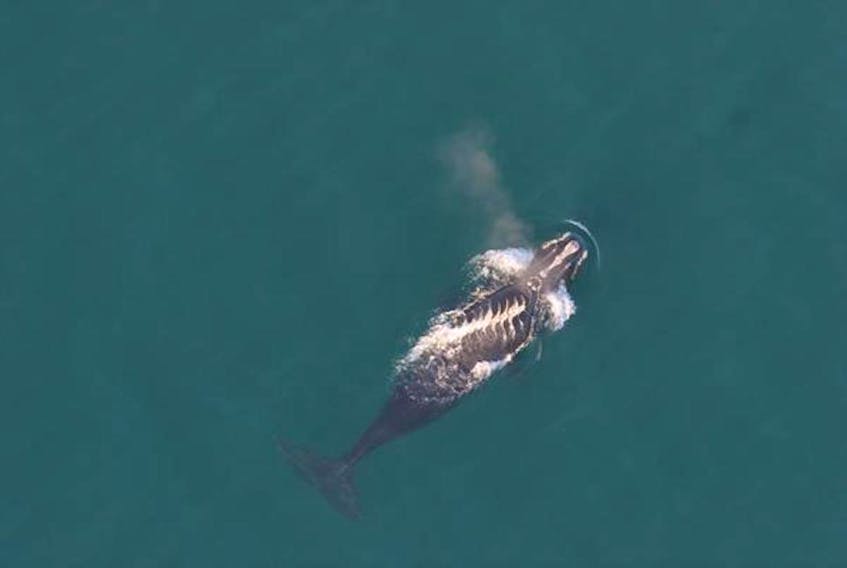A national environmental group says Transport Canada should enact mandatory speed limits for vessels travelling the Gulf of St. Lawrence during right whale migration season.
In a report released Monday, the group contends two-thirds of vessels travelling the Cabot Strait in 2020 did not slow to the recommended 10 knots during North Atlantic right whale migratory season.

According to Oceana Canada, data the group gathered from Global Fishing Watch showed two-thirds of vessel transits (1,055 out of 1,565) exceeded 10 knots during the two trial slowdown periods established by Transport Canada, from April 28 to June 15 and Oct. 1 to Nov. 15.
“Additionally, more than 40 per cent exceeded 12 knots, significantly increasing the risk of killing a right whale,” Kim Elmslie, campaign director for Oceana Canada, stated in a news release.
There were no reports of whale/boat collisions or whale deaths during 2020.
The 10-knot speed rule, for vessels longer than 13 metres, was a voluntary measure established by Transport Canada and the Department of Fisheries and Oceans (DFO) last year aimed at reducing collisions with North Atlantic right whales.
Last week, Transport Canada and DFO said the voluntary speed rule would be in place again this season.
However, Oceana Canada says the government should make the rule mandatory.
“We know that voluntary slowdowns are not working. The government must do everything possible to protect these whales, including putting in place a mandatory, season-long slowdown in the Cabot Strait,” said Elmslie.
“We know that slower speeds can help save right whales: the slower the vessel, the higher the likelihood of a whale surviving a collision."
The group says the speed rule should also apply to vessels under 13 metres.
“Recent studies have shown that even smaller vessel strikes can be fatal, too,” said Elmslie.
Oceana Canada also wants Transport Canada to release all vessel monitoring system (VMS) data publicly and to Global Fishing Watch.
The group has launched an online petition — at https://www.oceana.ca/en/our-campaigns/protect_north_atlantic_right_whales/campaign — asking people to support its campaign for mandatory speed limits and other measures for marine traffic in the Cabot Strait.
Balancing safety and environment

Responding to the Oceana Canada news release, Transport Canada told SaltWire Network there are several factors that can affect the ability of vessels to reduce speeds.
These factors include severe weather, tidal conditions and other navigational factors, the department stated in an email.
Transport Canada said continuation of the voluntary speed limit in 2021 will help the department further understand the factors that make it difficult for vessels to reduce speed.
The department noted information gained from last year’s trial voluntary slowdown in Cabot Strait indicated weather and sea conditions are a major impediment to compliance, but an important safety consideration.
“Had the slowdown been mandatory, Transport Canada would have had to lift the speed restriction 42 per cent of the time due to inclement weather in order to maintain navigational safety.”
“Additional pressures to maintain vessel transit schedules, especially during the COVID-19 pandemic when there continued to be high demand for goods, had also been noted as impacting participation rates.”
Transport Canada added it monitors vessel speeds using automatic identification system (AIS) data, provided by the Canadian Coast Guard, to check for compliance of mandatory measures and participation rates in voluntary measures such as the Cabot Strait trial slowdown.
Using that data, Transport Canada said, its analysis showed the cumulative participation rate for the 2020 Cabot Strait trial slowdown for both spring and fall was 38.2 per cent.
The department added there is still much to be learned about when and how North Atlantic right whales transit the Cabot Strait, to ensure the measures taken provide the greatest protection to the whales, while considering the safety and security of mariners, as well as economic impacts.

Meanwhile, Darrell Mercer, corporate communications officer for Marine Atlantic, told SaltWire the company was not significantly affected by the slow-down speed zone last year simply because the ferries do not enter that zone very often.
“The location of it is not in our normal operating area, but from time to time we might go into that voluntary speed reduction zone.”
If they did, he said, ferry captains would have slowed their speed from 14 to 10 knots.
Mercer added the company also implemented a marine mammal management plan, bringing aboard independent marine mammal observers to train bridge staff.
He said 52 Marine Atlantic staff members have been trained so far on how to identify and report any sightings of right whales, and any other marine mammals.
So far, he said, Marine Atlantic staff have not encountered any right whales during their crossings.
“We’ve been working very closely with Transport Canada through this process for the past several years, and we are all committed to protecting the right whale. We have complied with any direction we’ve been provided.”









